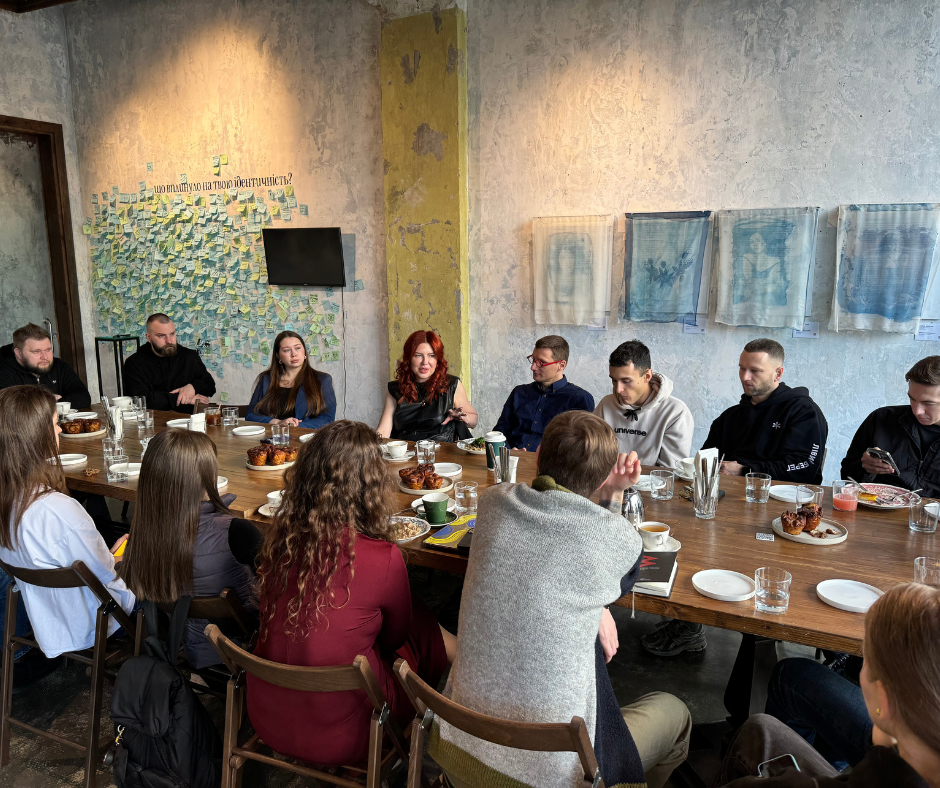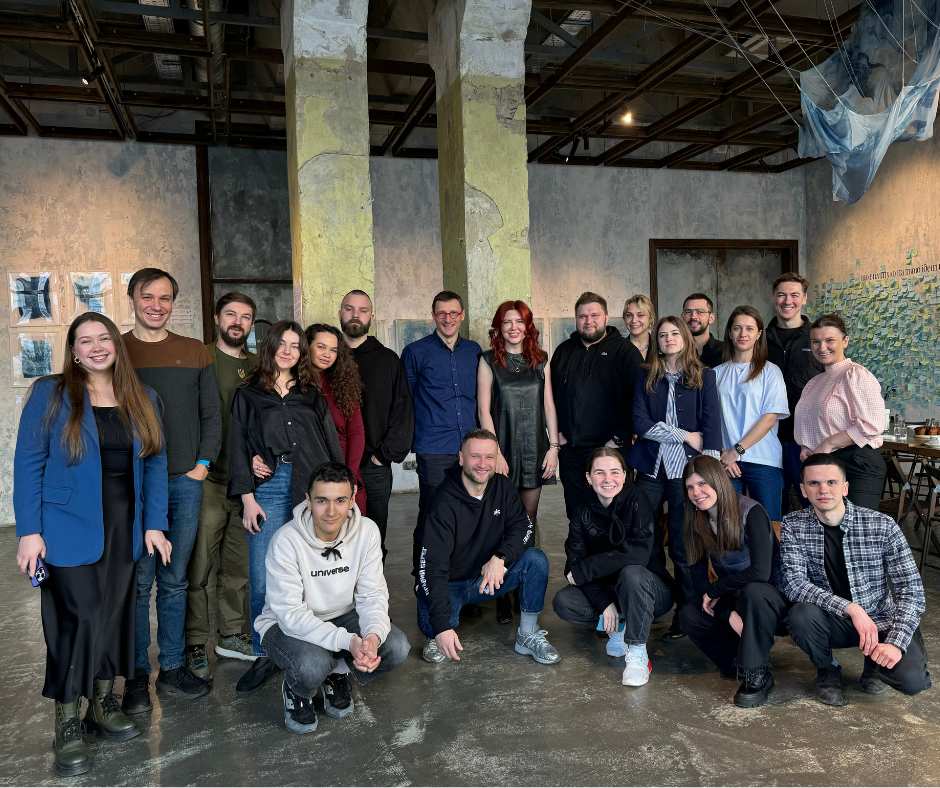May 8, 2024
August 16, 2025
The key to a successful startup is not only your idea or product but also how you develop your team and utilize resources.”
The guest at one of the business breakfasts, held as part of the venture-building program Mission Possible, was the COO at Readdle — Natalie Sadova. She not only inspired the participants with her journey, but also provided important advice on developing corporate culture and startup strategy.

Natalie started her career by creating her own marketing agency in 2003. At that time, the only competitors were international companies, but no local ones. It was a company that picked up speed very quickly, but also faded just as quickly due to the tragic circumstances of one of the co-founders. This gave Natalie a great push towards an international career.
After taking an internship in Austria, Natalie began her work at Villeroy & Boch, one of the oldest and most iconic brands of sanitary ware and dishes in the world. There, Natalie was responsible for marketing and sales in Southeast Europe, managing 13 countries. Being 25 years old, she already had to lay off people and solve issues of closing offices in different countries. This experience was so great that the vice-president of Villeroy & Boch later invited Natalie to Barry Callebaut, which is currently the largest chocolate manufacturer in the world. There she had the goal to open and develop a new EMEA region.
Building new offices in different countries, forming strategies in these countries, is what truly drove Natalie. “If they say they’re building a spaceship, don’t ask who you’ll be there, just sit down and fly.”
During her work at Barry Callebaut, a major breakthrough was made — Natalie formed a new division called “Gourmet”. The essence of this division is that they moved away from the box-pusher strategy and began to work with hotel chains, confectioneries, small craft chocolate manufacturers, and this required a completely different approach, namely the opening of a chocolate academy and innovation centers, with a larger presence, larger investments, and greater efforts. But it was this strategy that became the turning point when they started earning above-margin.
After the change of CEO in Barry Callebaut and the transition to a more industrial direction, Natalie decided that she did’t want to be part of the new policy and thus opened up a new opportunity for herself, having met the co-founder of Readdle.
She joined the company when there was a need to transition from a startup to a established business. Thanks to her experience in the corporate sector and change management, she was an ideal candidate to lead the company through this transition.
At the time of her arrival at Readdle, the company had 73 employees. Since then, the staff has grown to 336 people, significantly exceeding the initial growth plans to 200 people. Natalie acknowledges that such rapid growth has affected corporate culture and considers it a positive development. She notes that the company has become more mature, with clearer rules and less complex processes.
This is the foundation for any company striving for growth and stability. Your culture and strategy determine how your team will interact and what values it will share on the way to achieving common goals.
Currently, Readdle has 6 products and 230 million users worldwide and they continue to grow.
Granting autonomy to employees in solving work tasks is key to effective management. This is a value that will lead to independent task execution and independent decision-making. Provide the team with regular market evaluations and business indicators so they can adequately set their goals in the context of the real state of affairs in the market.
For example, if the average market growth is 60%, and the team grows by 30%, this may change their plans and goals.
Natalie notes that Readdle has a lean organizational structure where any employee can freely address any top manager directly with proposals or ideas for improvements.
“Our top management is not there to dictate what needs to be done. We are here to sponsor these initiatives and challenge them with our experience.”
If there have been no significant innovations in the last two years, the company is likely to face stagnation and loss of competitive advantages. Developers should determine whether their actions contribute to the real solution of problems and whether they meet the size of the market and consumer demands.
💡The size of the product market is determined by the size of the problem it solves, and this is critical for evaluating product opportunities.
You need to be ready to reassess and, if necessary, close old products or directions, to move forward with new, more relevant ideas.
Startups work well with “unlearning” approaches — this is a revision of knowledge, skills, ways of thinking, habits and the formation of new, more effective ones.
“You need to very much integrate your neural network into the company’s neural network and tailor all things.”
In large corporations, methodologies can be implemented with minimal explanations due to the presence of a clear hierarchy, but in startups or horizontal companies, it requires additional effort to engage and understand the entire team.
“Strategies, methodologies, just because they exist, and they are generally known, they do not work in companies where processes are not built.”
Understanding how to make money on each individual product can significantly increase your company’s revenue.
Currently, Readdle is focusing on enhancing monetization, rather than launching new products. Natalie explains that the company has significant resources to create products, but it is such a “piece of art” that it requires developing its skills in monetizing these products.
Natalie talked about transforming the company’s product strategy, which focused on simplifying and understanding its products. One of the main products — Documents, became one of the first products in the AppStore and has existed since the first iPhones, was once part of the standard set of applications in new releases from Apple. Currently, this product has an In-App Purchase function and covers managing all files on the phone, including a built-in VPN.
Another product from Readdle, Fluix, originated from the needs of the B2B market, starting with requests from large corporations like Coca-Cola, which required special licensing and security conditions. This product was initially developed from “PDF Expert” and focused on corporate needs, such as document management, form filling automation, and business process organization.

Startups have a unique opportunity to approach problem-solving innovatively. But without clearly established processes, this advantage can easily turn into chaos, slowing down development and growth. Building effective processes helps to organize the activities of a startup, ensuring consistency and predictability in work.
Clear processes are important for scaling a business: they allow new team members to integrate faster and effectively interact with existing systems. In addition, well-defined processes contribute to cost reduction, increased productivity, and improved quality of products or services.
However, it should be remembered that processes must be flexible and adaptive to changes in the market and consumer needs.
Thus, built processes in a startup are the basis for ensuring growth in the long term — this is the mission each participant of the venture building program Mission Possible strives to fulfill.